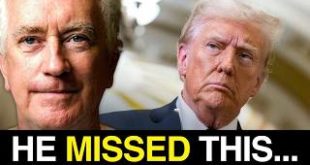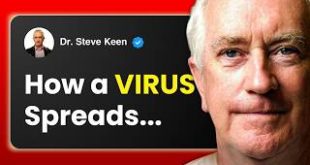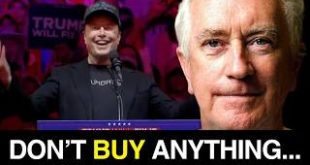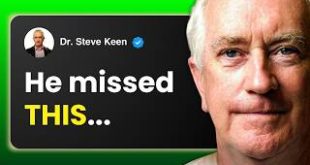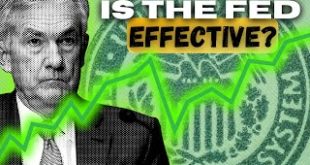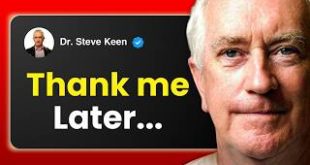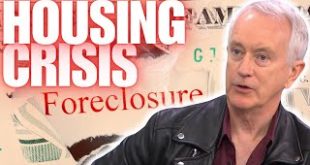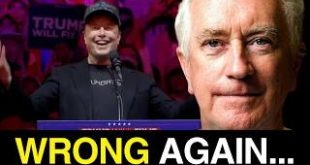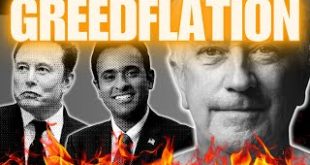If you enjoyed this video, you might also like my most popular video, "Don't Study Economics, Study THIS Instead." https://www.youtube.com/watch?v=oO7iCv_NsPE -- Who is Dr. Steve Keen? Dr. Steve Keen is an influential economist who has dedicated over 50 years to challenging mainstream economic theories. Since his days as a university student, he has been engaged in a David vs. Goliath battle against conventional economic models. Holding a Ph.D. in economics, Dr. Keen is...
Read More »Top Economist Explains System Dynamics in 80 Mins
If you enjoyed this video, you might also like my most popular video, "Don't Study Economics, Study THIS Instead." https://www.youtube.com/watch?v=oO7iCv_NsPE -- Who is Dr. Steve Keen? Dr. Steve Keen is an influential economist who has dedicated over 50 years to challenging mainstream economic theories. Since his days as a university student, he has been engaged in a David vs. Goliath battle against conventional economic models. Holding a Ph.D. in economics, Dr. Keen is...
Read More »Top Economist Explains US Inflation (Re: "Elon Musk is Wrong")
If you enjoyed this video, you might also like my most popular video, "Don't Study Economics, Study THIS Instead." https://www.youtube.com/watch?v=oO7iCv_NsPE -- Who is Dr. Steve Keen? Dr. Steve Keen is an influential economist who has dedicated over 50 years to challenging mainstream economic theories. Since his days as a university student, he has been engaged in a David vs. Goliath battle against conventional economic models. Holding a Ph.D. in economics, Dr. Keen is...
Read More »Top Economist Exposes Nobel Prize Winner on Climate Change
If you enjoyed this video, you might also like my most popular video, "Don't Study Economics, Study THIS Instead." https://www.youtube.com/watch?v=oO7iCv_NsPE -- Who is Dr. Steve Keen? Dr. Steve Keen is an influential economist who has dedicated over 50 years to challenging mainstream economic theories. Since his days as a university student, he has been engaged in a David vs. Goliath battle against conventional economic models. Holding a Ph.D. in economics, Dr. Keen is...
Read More »How does Monetary Policy Work?
This week on Real-Time with Steve Keen & Friends, we talk all things Monetary Policy with special guest David Fields. What does the interest rate, interest on reserves, open market operations and inflation expectations mean to central banks around the world. Links: https://www.patreon.com/c/ProfSteveKeen/home https://www.patreon.com/c/relearningeconomics https://www.planksip.org/ https://businessfilmbooth.podia.com/studio-set-up https://medium.com/@monetarypolicyinstitute
Read More »Top Economist: Everybody is WRONG about the US Debt Crisis!
If you enjoyed this video, you might also like my most popular video, "Don't Study Economics, Study THIS Instead." https://www.youtube.com/watch?v=oO7iCv_NsPE -- Who is Dr. Steve Keen? Dr. Steve Keen is an influential economist who has dedicated over 50 years to challenging mainstream economic theories. Since his days as a university student, he has been engaged in a David vs. Goliath battle against conventional economic models. Holding a Ph.D. in economics, Dr. Keen is...
Read More »The Housing Crisis
This week we have Douglas Dowell back for a second time to talk about the housing crisis seen across most developed nations. Good Links: https://www.patreon.com/c/ProfSteveKeen/home https://www.patreon.com/c/relearningeconomics https://businessfilmbooth.com/ https://www.planksip.org/ https://efequitygrp.com/
Read More »"Elon Musk is Wrong Again" Top Economist Warns the US
If you enjoyed this video, you might also like my most popular video, "Don't Study Economics, Study THIS Instead." https://www.youtube.com/watch?v=oO7iCv_NsPE -- Who is Dr. Steve Keen? Dr. Steve Keen is an influential economist who has dedicated over 50 years to challenging mainstream economic theories. Since his days as a university student, he has been engaged in a David vs. Goliath battle against conventional economic models. Holding a Ph.D. in economics, Dr. Keen is...
Read More »Greedflation
Is "Greedflation" just a buzzword, or is it a symptom of a deeper economic problem? Join us in this insightful livestream as we explore the controversial topic of greedflation — the phenomenon where companies allegedly raise prices beyond their costs to boost profits. Resource Links: https://www.patreon.com/c/ProfSteveKeen/home https://www.patreon.com/c/relearningeconomics https://businessfilmbooth.com/ https://www.planksip.org/
Read More »Was The Economy Really That Bad…
This week we recap 2024 and all the events in the economy. Also we will take a trip down memory lane on the livestreams progress over that last couple years. Links https://businessfilmbooth.com/ https://www.patreon.com/c/relearningeconomics https://www.patreon.com/c/ProfSteveKeen/home
Read More » Steve Keen’s Debt Watch
Steve Keen’s Debt Watch

